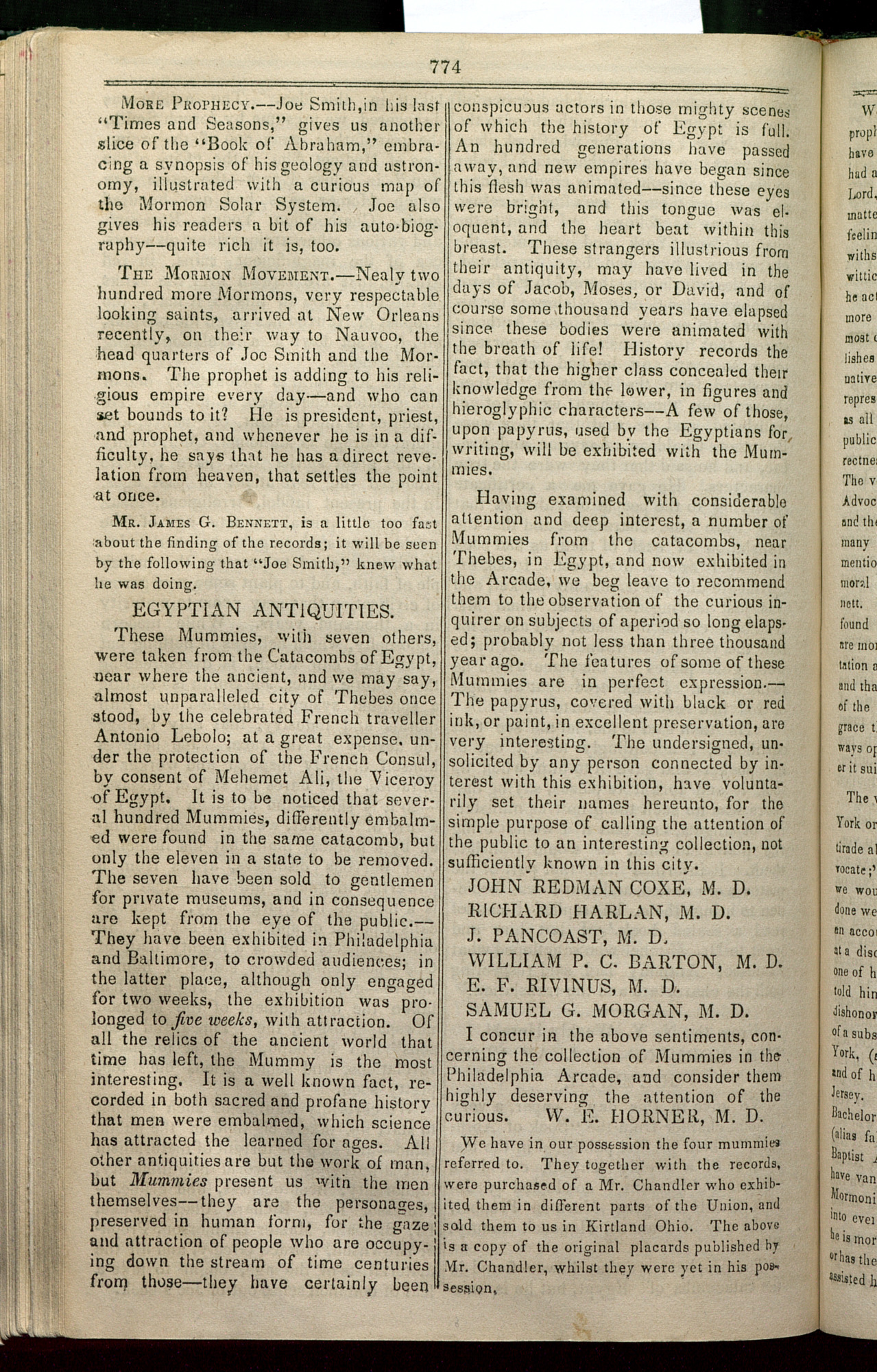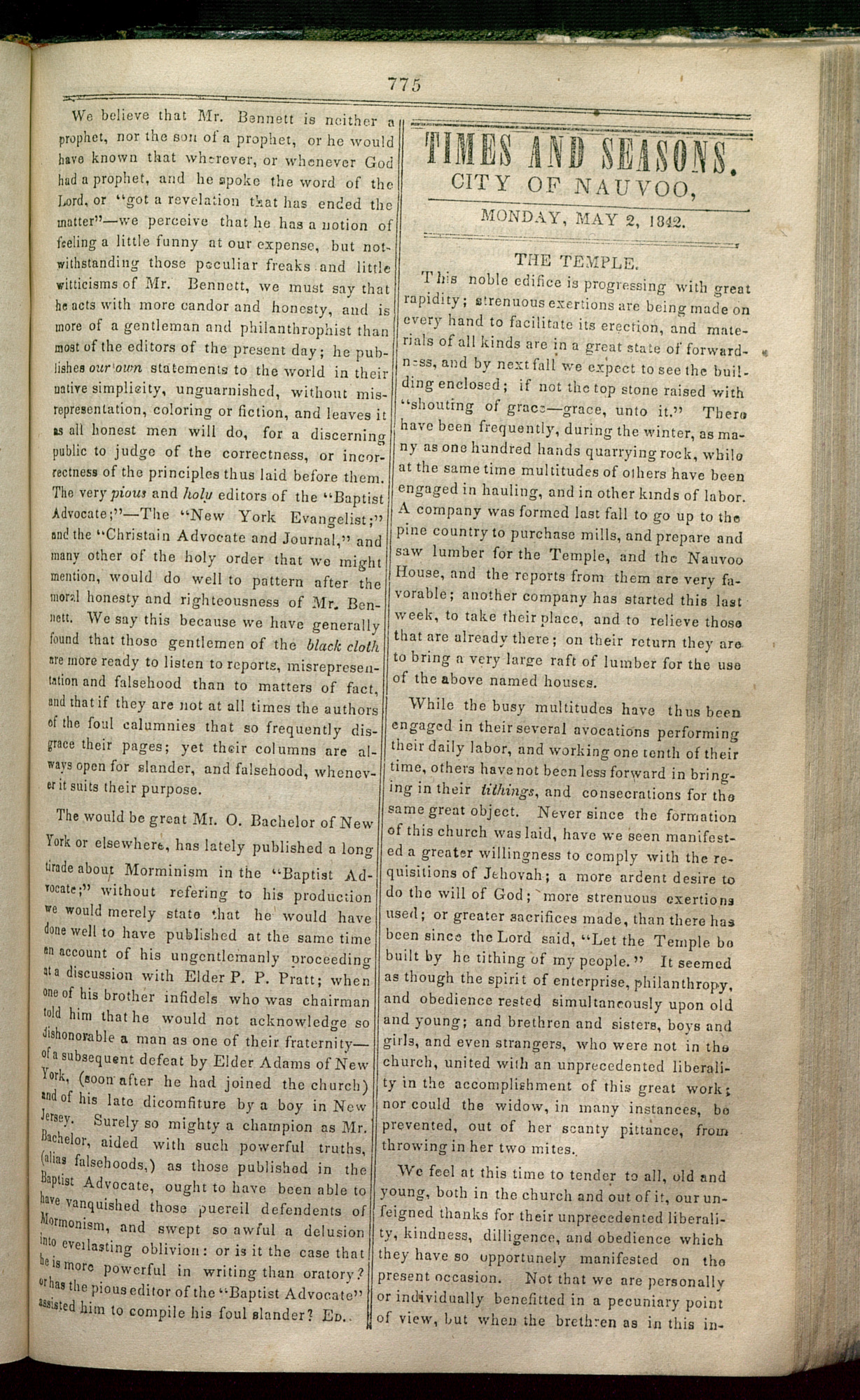Joseph responds to James Gordon Bennett on the mummies and papyri in the Times and Seasons.
- Type
- Periodical
- Hearsay
- Direct
- Reference
"Egyptian Antiquities," Times and Seasons 3, no. 13 (May 2, 1842): 774–755, The Joseph Smith Papers website, accessed August 11, 2021
- People
- William P. C. Barton, John Redman Coxe, Samuel G. Morgan, Richard Harlan, J. Pancoast, Antonio Lebolo, Muhammad Ali of Egypt, James Gordon Bennett, E. F. Rivinus, Michael Chandler, Joseph Smith, Jr., Origen Bachelor, W. E. Horner, Parley P. Pratt
- Audience
- Reading Public
- Transcription
Mr. James G[ordon] Bennett, is a little too fast about the finding of the records; it will be seen by the following that “Joe Smith,” knew what he was doing.
EGYPTIAN ANTIQUITIES.
These Mummies, with seven others, were taken from the Catacombs of Egypt, near where the ancient, and we may say, almost unparalleled city of Thebes once stood, by the celebrated French traveller Antonio Lebolo; at a great expense, under the protection of the French Consul, by consent of Mehemet Ali, the Viceroy of Egypt. It is to be noticed that several hundred Mummies, differently embalmed were found in the same catacomb, but only the eleven in a state to be removed. The seven have been sold to gentlemen for private museums, and in consequence are kept from the eye of the public.— They have been exhibited in Philadelphia and Baltimore, to crowded audiences; in the latter place, although only engaged for two weeks, the exhibition was prolonged to five weeks, with attraction. Of all the relics of the ancient world that time has left, the Mummy is the most interesting. It is a well known fact, recorded in both sacred and profane history that men were embalmed, which science has attracted the learned for ages. All other antiquities are but the work of man, but Mummies present us with the men themselves—they are the personages, preserved in human form, for the gaze and attraction of people who are occupying down the stream of time centuries from those—they have certainly been conspicuous actors in those mighty scenes of which the history of Egypt is full. An hundred generations have passed away, and new empires have began since this flesh was animated—since these eyes were bright, and this tongue was eloquent, and the heart beat within this breast. These strangers illustrious from their antiquity, may have lived in the days of Jacob, Moses, or David, and of course some thousand years have elapsed since these bodies were animated with the breath of life! History records the fact, that the higher class concealed their knowledge from the lower, in figures and hieroglyphic characters—A few of those, upon papyrus, used by the Egyptians for writing, will be exhibited with the Mummies.
Having examined with considerable attention and deep interest, a number of Mummies from the catacombs, near Thebes, in Egypt, and now exhibited in the Arcade, we beg leave to recommend them to the observation of the curious inquirer on subjects of a period so long elapsed; probably not less than three thousand year ago. The features of some of these Mummies are in perfect expression.— The papyrus, covered with black or red ink, or paint, in excellent preservation, are very interesting. The undersigned, unsolicited by any person connected by interest with this exhibition, have voluntarily set their names hereunto, for the simple purpose of calling the attention of the public to an interesting collection, not sufficiently known in this city.
JOHN REDMAN COXE, M. D.
RICHARD HARLAN, M. D.
J. PANCOAST, M. D.
WILLIAM P. C. BARTON, M. D.
E. F. RIVINUS, M. D.
SAMUEL G. MORGAN, M. D.
I concur in the above sentiments, concerning the collection of Mummies in the Philadelphia Arcade, and consider them highly deserving the attention of the curious. W. E. HORNER, M. D.
We have in our possession the four mummies referred to. They together with the records, were purchased of a Mr. [Michael] Chandler who exhibited them in different parts of the Union, and sold them to us in Kirtland Ohio. The above is a copy of the original placards published by Mr. Chandler, whilst they were yet in his possession.
We believe that Mr. [James Gordon] Bennett is neither a prophet, nor the son of a prophet, or he would have known that wherever, or whenever God had a prophet, and he spoke the word of the Lord, or “got a revelation that has ended the matter”—we perceive that he has a notion of feeling a little funny at our expense, but notwithstanding those peculiar freaks and little witticisms of Mr. Bennett, we must say that he acts with more candor and honesty, and is more of a gentleman and philanthrophist than most of the editors of the present day; he publishes our own statements to the world in their native simplicity, unguarnished, without misrepresentation, coloring or fiction, and leaves it as all honest men will do, for a discerning public to judge of the correctness, or incorrectness of the principles thus laid before them. The very pious and holy editors of the “Baptist Advocate;”—The “New York Evangelist;” and the “Christain Advocate and Journal,” and many other of the holy order that we might mention, would do well to pattern after the moral honesty and righteousness of Mr. Bennett. We say this because we have generally found that those gentlemen of the black cloth are more ready to listen to reports, misrepresentation and falsehood than to matters of fact, and that if they are not at all times the authors of the foul calumnies that so frequently disgrace their pages; yet their columns are always open for slander, and falsehood, whenever it suits their purpose.
The would be great Mr. O. Bachelor of New York or elsewhere, has lately published a long tirade about Morminism in the “Baptist Advocate;” without refering to his production we would merely state that he would have done well to have published at the same time an account of his ungentlemanly proceeding at a discussion with Elder P[arley] P. Pratt; when one of his brother infidels who was chairman told him that he would not acknowledge so dishonorable a man as one of their fraternity—of a subsequent defeat by Elder Adams of New York, (soon after he had joined the church) and of his late dicomfiture by a boy in New Jersey. Surely so mighty a champion as Mr. Bachelor, aided with such powerful truths, (alias falsehoods,) as those published in the Baptist Advocate, ought to have been able to have vanquished those puereil [puerile] defendents of Mormonism, and swept so awful a delusion into everlasting oblivion: or is it the case that he is more powerful in writing than oratory? or has the pious editor of the “Baptist Advocate” assisted him to compile his foul slander? Ed.
- Citations in Mormonr Qnas
The B. H. Roberts Foundation is not owned by, operated by, or affiliated with the Church of Jesus Christ of Latter-day Saints.


